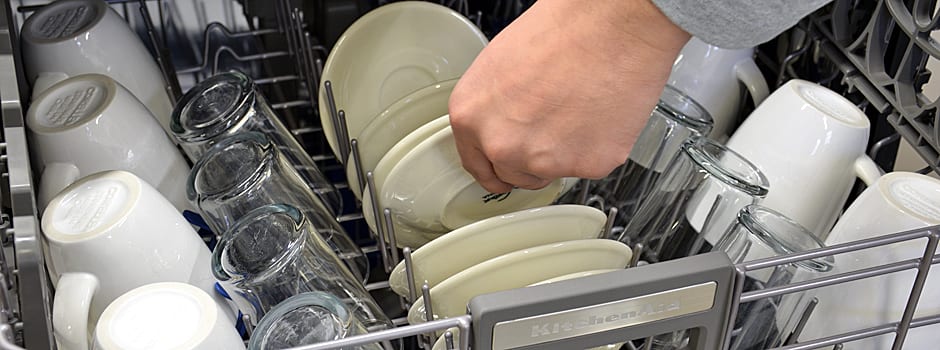Now, it's KitchenAid's turn. The KDTE554CSS (MSRP $1,749) debuts an all-new feature called AquaSense, a water recycling system that can cut your dishwasher's water use in half while still getting dishes clean. The dishwasher is currently available in a handful of stores, but it will debut across the country soon.
Our tests found that the KDTE554CSS's cycles were indeed both conservative and effective. However, when compared to other high-end dishwashers, this machine fell behind the top of the pack when it came to cleaning power and cycle times. And we weren't convinced this dishwasher is the best bang for your buck—electricity use remains high, and sale prices rarely drop below $1,500. But if you're concerned about water conservation, there's no better dishwasher on the market.
{{brightcove '3261563231001'}}
Design & Usability
Hidden Savings
The pride and joy of the KDTE554CSS is its AquaSense water recycling system. Already common in resource-conscious Europe, it recaptures water from the final rinse of the previous cycle, filters it clean, and stores it in a slim-profile 3.3-liter tank on the side of the machine. That water is on tap to pre-rinse the next cycle, and fresh water is then used to finish the wash.
The end result is lower water usage, and our tests proved it. If you don't use your washer for three weeks, the recycled water flushes from the tank. And the tank itself is thin enough that the washer will fit in a traditional cutout.
But you wouldn't know how efficient this dishwasher is just from looking at it. With a stainless steel front and protruding handlebar, the KDTE554CSS can fit in a high-end kitchen. There's also a small LCD screen above the handlebar, which displays the remaining cycle time in the form of depleting bars—similar to your cellphone's signal indicator. It's exactly the same as the LCD screen found on another KitchenAid dishwasher: The KDFE454CSS.
The touch-sensitive control panel is hidden away on the top of the door. The smooth buttons are delightfully responsive, but they are also prone to picking up smudges and fingerprints. Brilliant blue indicator lights match the color of the front-facing screen, and they give the machine an overall streamlined, professional appearance.
Inside, the silverware basket has slots for keeping your knives and forks from touching each other during the wash. These can be removed if you need to room for a larger serving/cooking utensil—such as a spatula. However, unlike with the KDFE454CSS's collapsible slots, the guides must be slid out and removed entirely, leaving you with less flexibility and a fair amount of wasted space.
A couple of rows of adjustable tines on the bottom and top racks do help in the flexibility department, so not all is lost. In total, we were able to fit ten place settings and a serving setting inside the KDTE554CSS.
{{ photo_gallery "Design Gallery" }}
Features
More than just AquaSense
This KitchenAid has a wide range of cycles and customization options. You can choose between Light/China, Normal Wash, and Heavy Duty cycles depending on how dirty your dishes are, or pick ProWash and let the dishwasher's soil sensors sort that out. A 1 Hour Wash is also available for when you need things done fast.
The KDTE554CSS has ProScrub, which is a set of high-intensity spray jets located in the back of the tub. You can further customize your wash by increasing the wash and rinse temperatures or using Heat Dry to activate the dishwasher's heating element during the drying portion of the cycle.
Performance
Standout water savings
Thanks to AquaSense, the Normal cycle only used 1.64 gallons of hot water. That's less than half what some other machines use on the same cycle, and it cleaned better than the majority of dishwashers we've tested.
But there were some drawbacks: The Normal cycle didn't remove all stains, and it had an issue with redeposit—when food particles wash off one item and onto another. The entire ordeal took an unacceptable three hours to complete.
The Heavy Duty cycle took 3.5 hours, but that's much more reasonable for a cycle that's supposed to handle the toughest, greasiest stains your kitchen can cook up. Many of the redeposit problems in the Normal wash were absent, and this cycle generally gave a good showing.
The 1 Hour Wash clocked in at 62 minutes, delivering on its promise. Its results were close to the Normal cycle's, and there were actually fewer instances of spinach getting spread around. Unfortunately, thicker stains like egg and dairy were a huge problem for this cycle, so this is not a suitable alternative for the Normal wash.
With AquaSense, we expected to see a very low annual cost for the KDTE554CSS. But our tests calculated that using a combination of washes would set you back just over $29 a year, which is only about $2 below average. Although the KDTE554CSS's cycles do in fact use less water than cycles on other dishwashers, the Normal and Heavy Duty used a ton of electricity. And that canceled out some of the savings.
For in-depth performance information, please visit the Science Page.
Before You Buy
Really promising technology.
While we're all for saving water and embracing new technology, the KDTE554CSS is pretty expensive relative to its cleaning power. It's also slow. Don't get us wrong: The KDTE554CSS still does a good job washing your dishes, and it uses precious little water—but when you're spending $1,749, you might want more than just good.
As it is, the KDTE554CSS simply can't justify its price tag on cleaning performance alone. For $200 less, you can get the Bosch SHE8PT55UC, which is faster, more efficient, and better at cleaning. For $400 less, the GE PDT750SSFSS is also amazing. Within the KitchenAid family, nearly every dishwasher is a good choice. Our top picks would be the KUDS30FXSS and the KUDE48FXSS.
But the KDTE554CSS isn't only about cleaning performance. It's a showcase for a new technology that could truly save a great deal of water. If KitchenAid manages to sell just 10,000 of these AquaSense-equipped machines, they could save over 80,000 gallons of water each week. Here's hoping that Aqua Sense goes mainstream, becoming more affordable and more common.
By the Numbers
The KitchenAid KDTE554CSS's AquaSense water recycling system makes the claim of reducing the dishwasher's water usage. We put that claim to the test in our labs and found it to be true. However, the KDTE554CSS does lack in other areas.
Even though the KDTE554CSS is a very good dishwasher, its test scores didn't top the charts. For less than its $1,749 price tag, you can find other dishwashers that will clean faster, better, and more efficiently than this KitchenAid.
Performance
The scores reminded us of dishwashers that cost half as much.
The KDTE554CSS's performance was not up to par with other high-end dishwashers. Its Normal cycle took almost three hours to finish, and it left visible milk and oatmeal stains behind. The Normal also had problems with redeposit, as spinach particles were found on other items—even on the glasses loaded on the top rack.
The Heavy Duty cycle did a much more thorough job. Milk and oatmeal stains weren't a problem for this cycle, and the redeposit problem was negligible. It had some trouble with the burnt cheese, though, and the overall performance reminded us of mid-tier machines.
The 1 Hour Wash did surprisingly well in some respects. This cycle used more water than the Normal Wash cycle, which could explain why we found fewer instances of redeposit. The drawback is that it didn't do so well with milk and egg stains, which is typical for fast cycles on most dishwashers.
Efficiency
Astounding water efficiency, but lots of electricity usage
With AquaSense, we would expect this area to be where the KDTE554CSS shines. The water recycling tank does cut down on water use significantly compared to other dishwashers. The Normal, 1 Hour Wash, and Heavy Duty cycles used 1.64, 6.15, and 7.23 gallons of hot water, respectively. However, the electricity usage of each cycle was very high: 0.93, 0.42, and 0.92 kWh, respectively.
We calculate annual utility cost by estimating the number of Normal, Heavy Duty, and Quick cycles the average user will run, and then total water and energy costs. For the KDTE554CSS, it's around $29.29, which is only about $2 below average.
Capacity
What's the deal with this silverware basket?
The KDTE554CSS holds up to ten place settings and a serving setting. There are some adjustable supports on the top and bottom racks to provide flexibility, and the racks themselves glide out smoothly on their tracks. One thing to note is the plastic silverware basket and its slide-out slots. Although this design allows for fitting larger items in the basket, you end up with a free-floating piece that needs to be stowed away.
{{ photo_gallery "Capacity Gallery" }}
Meet the tester
Johnny Yu is a former news and review writer for Reviewed.
Checking our work.
Our team is here to help you buy the best stuff and love what you own. Our writers, editors, and experts obsess over the products we cover to make sure you're confident and satisfied. Have a different opinion about something we recommend? Email us and we'll compare notes.
Shoot us an email

